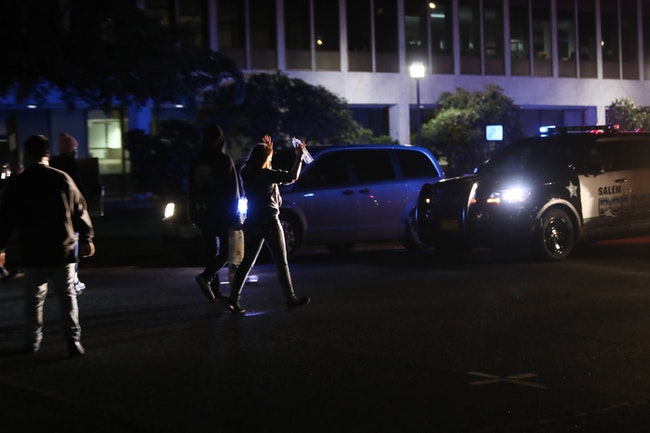Jury awards $1 million to protester injured by Salem police

The city of Salem will have to pay a protester just over $1 million because police violated her constitutional rights when they shot her with rubber bullets at a local protest two years ago.
A federal jury on Friday, Sept. 30, unanimously ruled in favor of Eleaqia McCrae, 22, who sued the city over its handling of a protest against police violence on May 31, 2020. She said in her suit that she was left with permanent eye damage after an officer shot her twice with rubber bullets, hitting her chest and eye.
Following a trial last week in the U.S. District Court of Oregon, the jury unanimously found Salem Police Department officer Robert Johnston used excessive force when he shot McCrae, violating her Fourth Amendment rights.
The jury, however, said Johnston didn’t intentionally target her or commit battery and didn’t violate her First Amendment rights.
The jury awarded McCraw $250,000 for economic loss and $800,000 in non-economic damages.
“My client is pleased with the jury’s award and recognition of the excessive force used on her,” McCrae’s attorney, Kevin Brague, said in an email to Salem Reporter.
McCrae grew up in Salem and has family in the city, but now lives in the Portland area, Brague said. She was 20 at the time of the protest.
“We appreciate the jury’s work on this case and respect their verdict. Because there is ongoing legal argument and the case has not yet concluded, we cannot offer further comment at this time,” according to an email from Courtney Knox Busch, the city’s strategic initiatives manager.
She did not respond directly to questions from Salem Reporter asking whether the city intended to appeal, or whether any police department training or policies would be changed as a result of the verdict.
Knox Busch said she was not aware of another civil case in the past decade where a jury has awarded $1 million or more in damages to a plaintiff suing the city.
McCrae sued the city and Johnston in August 2020, contending Salem police intentionally targeted Black protesters during a peaceful demonstration and corralled demonstrators without providing them an avenue to leave as officers attempted to disburse the march.
The jury’s judgment is against Johnston, who was acting in his official capacity as a Salem police officer at the time.
According to her complaint, McCrae, a West Salem High School graduate and student-athlete at Mt. Hood Community College, attended the Salem protest following the murder of George Floyd by a Minneapolis police officer. She went with her sister and a friend, marching with demonstrators to the Center Street Bridge and back to the Capitol around 9 p.m.
The lawsuit said the crowd was stopped by Salem police outfitted in full SWAT gear with a military vehicle, blocking marchers from proceeding. Police ordered the crowd to disburse, but protesters near the front of the march couldn’t because they were blocked by police in front and other marchers in the back, the suit said.
“When the march was stopped by SPD there was no rioting, looting, or destruction of public and private property. There was no violence prior to the SPD show of force. It was a peaceful assembly. The marchers, including Elea McCrae, linked arms, and silently knelt in the street. The marchers and Elea McCrae then stood up,” the suit said.
When McCrae got up to leave, the lawsuit said Johnston shot her twice. One rubber bullet hit her chest and the other hit her eye. After being shot in the eye, McCrae passed out, her complaint states.
She suffered permanent vision loss in her eye, the suit said.
The Salem Police Department hired Johnston in 2004, according to records from the Oregon Department of Public Safety Standards and Training, the state’s police licensing agency. He retired from the agency last June 30.
In the city’s response to the suit, attorneys Gerald Warren and Jennifer Gaddis said McCrae’s injuries “if any” were caused by “by failing to disperse the area when the protests were no longer peaceful.”
The city argued police tactics were justified in response to demonstrators throwing objects at officers, and denied that the march was peaceful at the time police stopped it.
Police arrested over a dozen people in Salem during protests and marches in the summer of 2020 following Floyd’s murder.
After vandalism and rioting accompanied the demonstrations early on, the city enacted a curfew to prevent more disturbances.
Most of those arrested initially faced charges of riot, disorderly conduct, trespassing or interfering with officers, though several who spoke to Salem Reporter following their arrests said they were cornered by police while trying to leave.
On June 29, 2020, the Marion County District Attorney’s Office dismissed criminal charges against 14 people arrested during protests the previous month. Deputy District Attorney Amy Queen said attorneys determined they didn’t meet the threshold for the office to continue prosecution.
Contact reporter Rachel Alexander: [email protected] or 503-575-1241.
JUST THE FACTS, FOR SALEM – We report on your community with care and depth, fairness and accuracy. Get local news that matters to you. Subscribe to Salem Reporter. Click I want to subscribe!

Rachel Alexander is Salem Reporter’s managing editor. She joined Salem Reporter when it was founded in 2018 and covers education, economic development and a little bit of everything else. She’s been a journalist in Oregon and Washington for a decade and is a past president of Oregon's Society of Professional Journalists chapter. Outside of work, you can often find her gardening or with her nose buried in a book.



